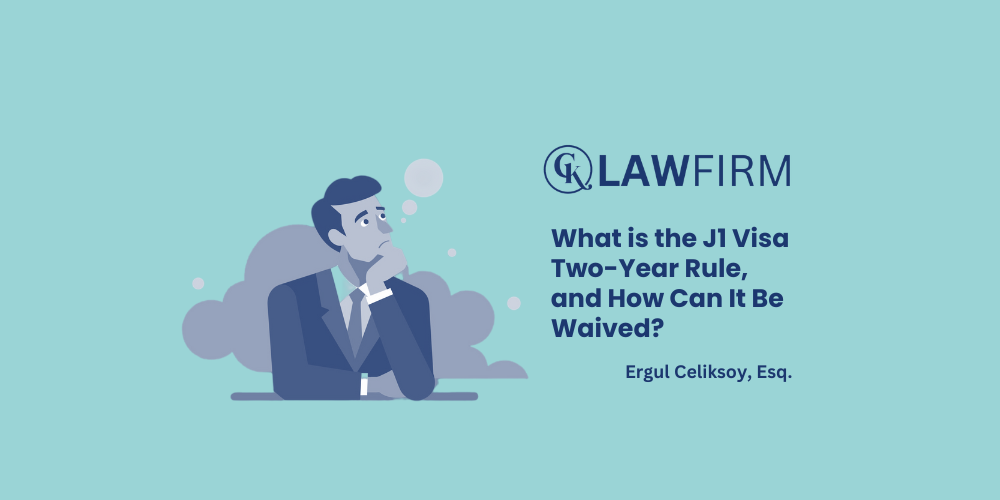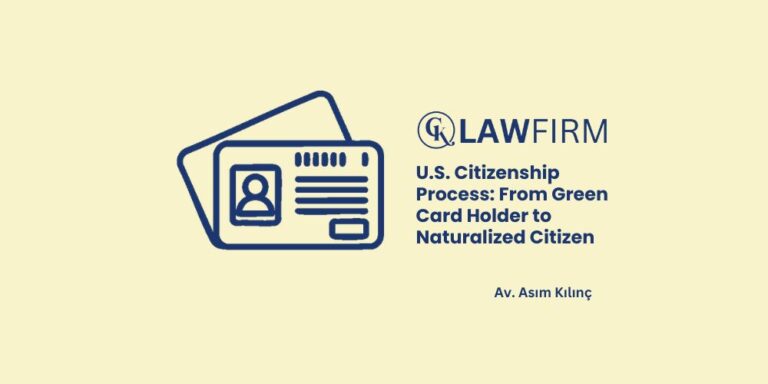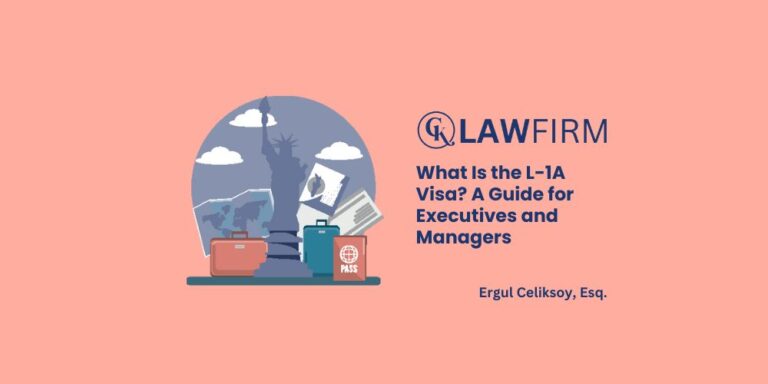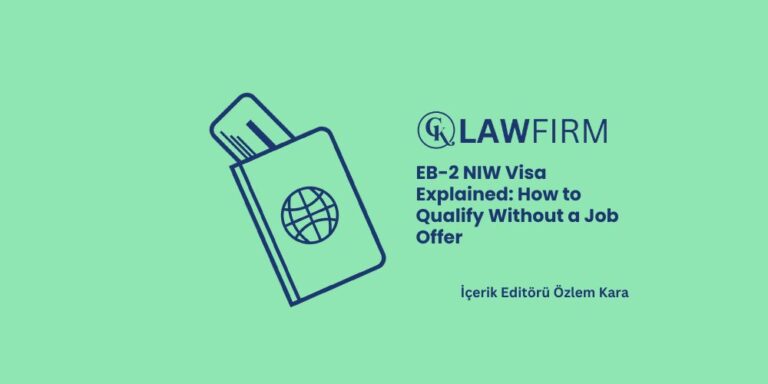Schedule an Appointment with Our Attorneys Now

What is the J1 Visa Two-Year Rule, and How Can It Be Waived?
Learn about the J1 Visa Two-Year Rule. Discover who it applies to, what it means, and how to get a waiver with our detailed guide.
By Ergul Celiksoy, Immigration Attorney at CK Law Firm
As an immigration attorney, one of the most frequently asked questions by my clients who wish to work or study in the United States concerns the J1 visa’s two-year rule. In this article, I will provide answers to the most common questions about the J1 visa’s two-year rule, based on the numerous cases I have handled and the hundreds of clients I have consulted. By the end of this article, you will have answers to the following questions:
- What is the J1 Visa?
- What is the J1 Visa Two-Year Rule?
- When Does the Two-Year Rule Apply?
- Is It Possible to Obtain a Waiver for the Two-Year Rule?
- How to Waive the J1 Visa Two-Year Rule?
- Waiver Application Process
If you have any further questions about the J1 visa, please feel free to reach out to me via the comments section below, send me a direct message on LinkedIn, or contact me through the CK Law Firm Immigration Attorney Firm’s website, of which I am a founding partner.
What is the J1 Visa?
The J1 visa is a type of exchange visa used for participating in education, training, or cultural exchange programs in the United States. This visa is typically granted to students, researchers, teachers, and other participants who need to be in the U.S. for a specific period. J1 visa holders are generally required to return to their home country after completing their program. The J1 visa programs are managed by the U.S. Department of State and supported by specific sponsor organizations. The J1 visa has various categories, including:
- J1 Trainee: Allows individuals with a specific university degree or expertise in a certain field to work in the U.S.
- J1 Intern (Internship): A category for students currently enrolled in educational institutions or recent graduates.
- Work and Travel (WAT): A category used by university students in their home country to work and travel in the U.S. during the summer.
- Other J1 Categories: There are also categories for teachers, camp counselors, au pairs, physicians, and secondary school students.
What is the J1 Visa Two-Year Rule?
Some J1 visa holders are required to return to their home country or their country of residence for the past five years after their visa expires. This rule is known as the “J1 Visa Two-Year Rule.” This rule restricts J1 visa holders from applying for certain immigration statuses, such as a Green Card, H1B work visa, K1 fiancé visa, or L1 transfer visa, for two years.
When Does the Two-Year Rule Apply?
The two-year rule does not apply to every J1 visa holder. Whether this rule applies depends on specific criteria:
- Programs Financed by the U.S. or Home Government:
If your J1 visa program is funded by the U.S. government, your own government, or an international organization, this rule may apply to you. This means that if your program was supported by the U.S. government or you received financial support from your home country, the rule may be enforced. - Skills List:
The U.S. Department of State publishes a list that identifies critical skills and professions in certain countries. If your education or experience falls under one of these skills, you may be subject to the two-year rule. This is because there is a high demand for such skills in your home country, and you are expected to return to contribute to your country after your training in the U.S. - Medical Training:
If you received a J1 visa for medical training in the U.S., the two-year rule may apply to you. This rule encourages medical professionals to return to their home countries to apply their knowledge and experience within their communities.
Is It Possible to Obtain a Waiver for the Two-Year Rule?
In some cases, a waiver can be obtained to bypass the J1 visa two-year rule. However, obtaining this waiver is not an easy process and is subject to specific conditions:
- Government Approval: Your home government may exempt you from the two-year return requirement. This is possible with an official authorization from the relevant authorities in your home country.
- Hardship Situation: If you have a U.S. citizen or Green Card holder spouse or child, and complying with the two-year rule would cause significant hardship to them, this can be considered as grounds for a waiver. Hardship can include family separation or financial difficulties.
- Risk of Persecution: If you can prove that you would face persecution in your home country due to political, religious, or other reasons, you may also apply for a waiver. This generally applies to situations involving serious human rights violations or risk of persecution.
How to Waive the J1 Visa Two-Year Rule?
Individuals in the U.S. on a J1 visa who are subject to the two-year rule can waive this rule under specific conditions. Obtaining a waiver may allow you to stay in the U.S. permanently or change to another immigration status.
- No Objection Statement from Your Home Government:
You can obtain a waiver from your home government for the two-year return requirement. This document is issued by the competent authorities of your home country and submitted to the U.S. Department of State. To obtain this document, you generally need to contact the U.S. Embassy or Consulate in your country. - U.S. Government or Agency Approval:
If your J1 visa program was funded by the U.S. government or a U.S. government agency, you may need approval from that agency to obtain a waiver. In such cases, the agency must authorize that you are not subject to the two-year rule. - Exceptional Hardship:
If you have a U.S. citizen or Green Card holder spouse or child and can prove that complying with the two-year rule would cause significant hardship to them, you can apply for a waiver on these grounds. Hardship could include financial difficulties, health problems, or family separation. - Risk of Persecution:
If you can prove that you would face persecution due to political, religious, ethnic, or other reasons if you return to your home country, you may be eligible for a waiver from the two-year rule. This waiver typically requires a thorough examination of your case. - Interested Government Agency Waiver:
A U.S. government agency can request a waiver from the two-year rule. This is usually applicable when the J1 visa holder’s stay in the U.S. is considered essential for national interests. For example, a research institution in the U.S. may request such a waiver if they want you to continue your research projects.
Waiver Application Process
- DS-3035 Form: First, you need to fill out the DS-3035 form to apply for a waiver from the two-year rule. This form can be obtained from the U.S. Department of State’s website.
- Required Documents: Depending on your situation, you must prepare the relevant documents. These documents should include proof of your situation (e.g., a No Objection Statement from your home government, hardship documents, persecution risk evidence, etc.).
- Application Fee: A fee is required to submit a waiver application. The fee amount may vary over time, so it is important to check the latest information before applying.
- Application Process: The application process is reviewed by the U.S. Department of State and may take several months. You can stay in contact with the Department during the process to get updates on your application status.
Conclusion
The J1 visa two-year rule can significantly impact your stay in the U.S. and future immigration options. This rule is crucial, especially for J1 visa holders who wish to stay or work in the U.S. It is important to carefully review your visa documents to understand whether the rule applies to you and plan your future accordingly.
If you wish, you can reach us at cklawfirm.org, via email at info@cklawfirm.org, or directly on LinkedIn to find out if you are eligible for a J1 visa waiver with our free consultation service. All you need to do is send us your CV. We will review your CV and get back to you within 24 hours.
Who is Attorney Ergül Çeliksoy?
Attorney Dr. Ergül Çeliksoy is the co-founder of CK Law Firm and also serves as an Assistant Professor of Law at the University of Nottingham. With extensive experience in U.S. immigration law, Dr. Çeliksoy completed his master’s degree in international law and human rights at the University of Nottingham in 2017 before beginning his Ph.D. studies at the same university. Dr. Çeliksoy earned his Ph.D. in law at the University of Nottingham School of Law in 2022, marking a significant milestone in his academic career. He is a recognized academician with expertise in modern slavery, criminal justice, and criminal law, with publications in leading academic journals.
As a member of the California Bar, Dr. Çeliksoy provides outstanding service to his clients, particularly in U.S. immigration law cases. His knowledge and experience in immigration law are valuable assets to CK Law Firm’s practice in this field. Dr. Çeliksoy offers comprehensive and strategic solutions to his clients in immigration law cases, helping them secure their legal status in the U.S. His deep understanding of human rights and immigration processes, along with his expertise in modern slavery and criminal law, enables him to effectively address the complex legal issues faced by immigrants. By offering reliable and effective legal counseling services, Dr. Çeliksoy helps his clients build new lives in the U.S.





